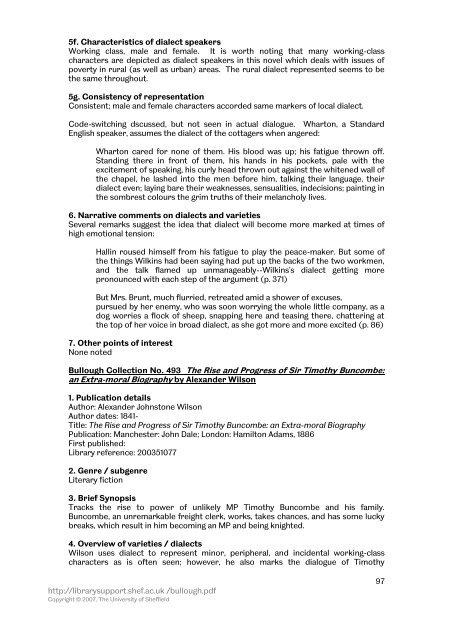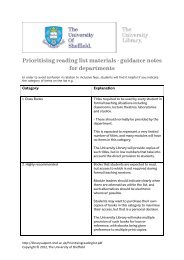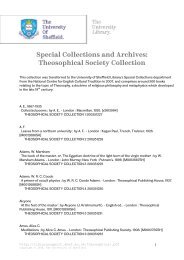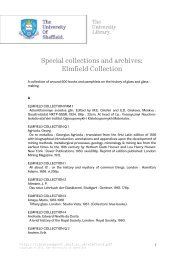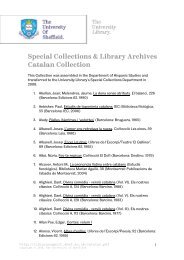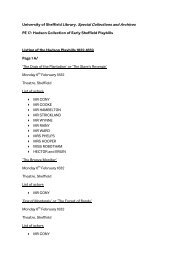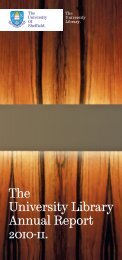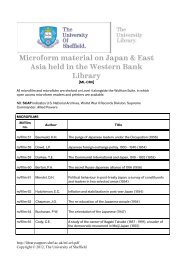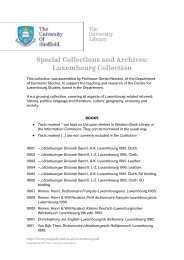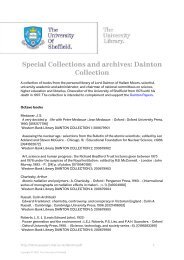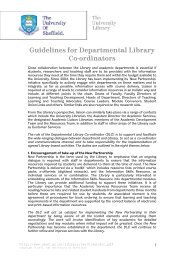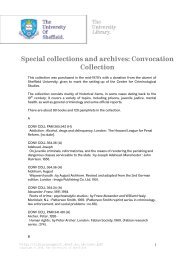The Geoffrey Bullough Collection - Temporary Home Page ...
The Geoffrey Bullough Collection - Temporary Home Page ...
The Geoffrey Bullough Collection - Temporary Home Page ...
Create successful ePaper yourself
Turn your PDF publications into a flip-book with our unique Google optimized e-Paper software.
5f. Characteristics of dialect speakers<br />
Working class, male and female. It is worth noting that many working-class<br />
characters are depicted as dialect speakers in this novel which deals with issues of<br />
poverty in rural (as well as urban) areas. <strong>The</strong> rural dialect represented seems to be<br />
the same throughout.<br />
5g. Consistency of representation<br />
Consistent; male and female characters accorded same markers of local dialect.<br />
Code-switching dscussed, but not seen in actual dialogue. Wharton, a Standard<br />
English speaker, assumes the dialect of the cottagers when angered:<br />
Wharton cared for none of them. His blood was up; his fatigue thrown off.<br />
Standing there in front of them, his hands in his pockets, pale with the<br />
excitement of speaking, his curly head thrown out against the whitened wall of<br />
the chapel, he lashed into the men before him, talking their language, their<br />
dialect even; laying bare their weaknesses, sensualities, indecisions; painting in<br />
the sombrest colours the grim truths of their melancholy lives.<br />
6. Narrative comments on dialects and varieties<br />
Several remarks suggest the idea that dialect will become more marked at times of<br />
high emotional tension:<br />
Hallin roused himself from his fatigue to play the peace-maker. But some of<br />
the things Wilkins had been saying had put up the backs of the two workmen,<br />
and the talk flamed up unmanageably--Wilkins's dialect getting more<br />
pronounced with each step of the argument (p. 371)<br />
But Mrs. Brunt, much flurried, retreated amid a shower of excuses,<br />
pursued by her enemy, who was soon worrying the whole little company, as a<br />
dog worries a flock of sheep, snapping here and teasing there, chattering at<br />
the top of her voice in broad dialect, as she got more and more excited (p. 86)<br />
7. Other points of interest<br />
None noted<br />
<strong>Bullough</strong> <strong>Collection</strong> No. 493 <strong>The</strong> Rise and Progress of Sir Timothy Buncombe:<br />
an Extra-moral Biography by Alexander Wilson<br />
1. Publication details<br />
Author: Alexander Johnstone Wilson<br />
Author dates: 1841-<br />
Title: <strong>The</strong> Rise and Progress of Sir Timothy Buncombe: an Extra-moral Biography<br />
Publication: Manchester: John Dale; London: Hamilton Adams, 1886<br />
First published:<br />
Library reference: 200351077<br />
2. Genre / subgenre<br />
Literary fiction<br />
3. Brief Synopsis<br />
Tracks the rise to power of unlikely MP Timothy Buncombe and his family.<br />
Buncombe, an unremarkable freight clerk, works, takes chances, and has some lucky<br />
breaks, which result in him becoming an MP and being knighted.<br />
4. Overview of varieties / dialects<br />
Wilson uses dialect to represent minor, peripheral, and incidental working-class<br />
characters as is often seen; however, he also marks the dialogue of Timothy<br />
http://librarysupport.shef.ac.uk /bullough.pdf<br />
Copyright © 2007, <strong>The</strong> University of Sheffield<br />
97


